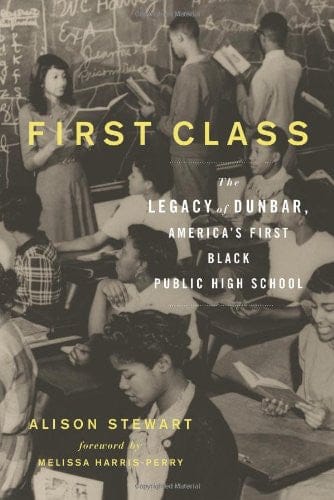
First Class by Alison Stewart
-
Dunbar High School in Washington, DC, defied the odds and, in the process, changed America. In the first half of the twentieth century, Dunbar was an academically elite public school, despite being racially segregated by law and existing at the mercy of racist congressmen who held the school’s purse strings. These enormous challenges did not stop the local community from rallying for the cause of educating its children.
-
Dunbar attracted an extraordinary faculty: one early principal was the first black graduate of Harvard, almost all the teachers had graduate degrees, and several earned PhDs—all extraordinary achievements given the Jim Crow laws of the times. Over the school’s first eighty years, these teachers developed generations of highly educated, high-achieving African Americans, groundbreakers that included the first black member of a presidential cabinet, the first black graduate of the US Naval Academy, the first black army general, the creator of the modern blood bank, the first black state attorney general, the legal mastermind behind school desegregation, and hundreds of educators.
-
By the 1950s, Dunbar High School was sending 80 percent of its students to college. Today, as with too many troubled urban public schools, the majority of Dunbar students struggle with reading and math. Journalist and author Alison Stewart, whose parents were both Dunbar graduates, tells the story of the school’s rise, fall, and path toward resurgence as it looks to reopen its new, state-of-the-art campus in the fall of 2013.
-
First Class: The Legacy of Dunbar, America's First Black Public High School
By Alison Stewart (Author)
Hardcover: 352 pages
Publisher: Chicago Review Press; School edition (August 1, 2013) -
“In First Class, Alison Stewart skillfully chronicles the rise and fall of Dunbar High School, America’s first black public high school. Recalling the institution's extraordinary legacy and the lives of its accomplished alumni—her own parents included—Stewart will convince you that there’s cause for hope, and that the school’s brightest days may still be ahead.” —President Bill Clinton
“The US Army’s first black general. The first black federal judge. The first black cabinet secretary. If you pull the thread that ties together these (and so many other) pioneers in African American achievement, you find the story of Dunbar High School. Alison Stewart uncovers the hidden history of a great American institution, and shows us the moving, herculean, human effort it took to build it in the first place, and to rebuild it now. What an amazing story—what a great book.” —Rachel Maddow, author of Drift: The Unmooring of American Military Power, and host of The Rachel Maddow Show
“Many of the legal minds behind school desegregation learned their sense of self and sense of determination at Dunbar High School. First Class explains how Dunbar produced extraordinary men and women who could be role models for any child of any era.” —Hill Harper, actor and author of Letters to a Young Brother
“A gifted journalist, Alison Stewart tells this remarkable story with depth and insight. Meticulously researched and engagingly written, First Class does what great books should do: it finds universal meaning in particular places. In Stewart, Dunbar’s complicated life and times have found a brilliant biographer." —Jon Meacham, Pulitzer Prize–winning author of American Lion: Andrew Jackson and the White House
“First Class is first rate—the extraordinary story of a historic school and its remarkable students and teachers. With great style and real care, Alison Stewart weaves a wonderful tale of adversity, triumph, and overcoming.” —Ben Sherwood, president of ABC News
“[author Alison] Stewart’s question, 'What will the newest incarnation of Dunbar be?' remains germane, especially as its new building is scheduled to open in fall 2013. Contemplating Dunbar’s history may offer answers.”—Publishers Weekly "A well-reported, passionate study of the triggers for failure and success within American urban education."—Kirkus Reviews "Stewart’s history of a single school also manages to tell the story of black DC, of school desegregation, and of education reform. One need not be a Washington native or a Dunbar grad to appreciate this thought-provoking and thoroughly pleasant history."—Library Journal, starred review
